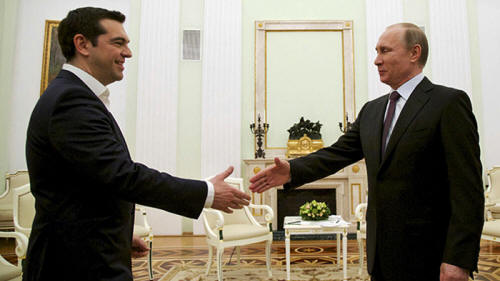|

by Geoff Dyer
June 21, 2015
from
FT Website

Alexis Tsipras, left,
and Vladimir Putin
Throughout the prolonged showdown between Greece and its creditors,
the Obama administration has largely sat on the sidelines, issuing
the occasional warning about the potential economic impact of a
default.
But with Greece now on the verge of bankruptcy, the US is also
beginning to worry about the political fallout from a deeper crisis
and the potential for Russia to gain increased influence over a NATO
member.
As Washington tries to maintain a united western front in support of
sanctions on Russia over Ukraine, a Greek default could provide
Moscow an opportunity to sow new divisions among America's European
allies.
"You can easily see how
geopolitically this would be a gift to Russia," says Sebastian
Mallaby at the Council on Foreign Relations.
"You do not want Europe to have to
deal with a Greece that is a member of NATO but which all of a
sudden hates the west and is cosying up to Russia."
Greece was regarded as a frontline state
against the advance of Soviet-backed communism during the cold war.
Its EU accession in 1981 is one factor
that cemented its identity as a western democracy, something that
was deepened 20 years later with the adoption of the euro.
For some months, the administration of President
Barack Obama has
been quietly urging Germany and other EU members to try to find a
way to resolve the stand-off with Greece.
While economic
considerations have been at the forefront, diplomats say the EU's
position on Ukraine has also been part of the conversation.
The visit by Greek prime minister Alexis Tsipras to St Petersburg
late last week served as a reminder of the current Greek
government's political ties to President Vladimir Putin's Russia and
showed its willingness to look towards Moscow at moments when the
dispute with international creditors is at its most intense.
The Russia trip also prompted new speculation that Moscow might be
willing to lend substantial financial assistance to Athens, although
this prospect is played down by analysts in Washington given the
scale of the economic problems Greece would likely face if it were
to default.
"It is not as if Russia has a lot of
money to throw around," says Thomas Wright at the Brookings
Institution in Washington. "Russia is not a huge potential
export market, it is not a new economic option that did not
exist for the Greeks before the crisis."
Instead, the worry is that the prolonged
economic instability that could result from a default would deepen
the political hostility towards the rest of Europe among the Greek
electorate, opening an opportunity for Russia to boost its sway in
the country.
Throughout the Ukraine crisis, Moscow has been working to weaken
support in the EU for sanctions, which require unanimous backing
from the bloc's 28 members.
It has pushed to encourage pro-Russian
political sentiment in Hungary and southeastern Europe, partly
through its energy diplomacy.
Angela Merkel, the German chancellor, last year warned about
Russia's designs in the region. Her worry about the geopolitical
ramifications of a Grexit is one consideration that separates her
from Wolfgang Schäuble, her hard-line finance minister.
Obama administration officials insist the EU remains committed to
the sanctions on Russia over Ukraine.
"We still believe that Europe
remains united against Russia and what they're doing," says John
Kirby, state department spokesman, when asked about the
potential impact of a Greek default.
"I think coming out of the G7 you saw a lot of unity in Europe
for continued sanctions against Russia and th possibility for
increased sanctions to further isolate Russia."
Julianne Smith, a former Obama
administration official now at the Center for a New American
Security, says the showdown over Greece plays into a broader
Washington concern about the effectiveness of the EU at a time when
the UK is also planning a referendum about its own membership.
"Washington is worried about both
the Grexit and Brexit situations," she says.
"Both situations are a distraction
at a time when we need Europe to show a lot of leadership."
Instead, the result of the succession of crises is,
"likely to
provoke a period of navel-gazing" among Europe's leaders.
|


